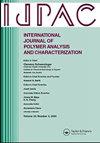Preparation and characterization of fumed silica added PMMA denture base materials
IF 1.6
4区 工程技术
Q4 POLYMER SCIENCE
International Journal of Polymer Analysis and Characterization
Pub Date : 2024-10-17
DOI:10.1080/1023666X.2024.2410754
引用次数: 0
Abstract
This study was carried out to investigate the chemical, mechanical, and structural properties of increasing amounts of fumed silica added to PMMA denture base material. The effect of adding fumed silica at three different concentrations (0.5%, 1%, and 2% by weight) to PMMA was studied using Fourier transform infrared spectroscopy (FTIR), dynamic mechanical analysis (DMA), density, flexural strength, hardness, atomic force microscopy (AFM), and scanning electron microscopy (SEM). The results showed that the highest flexural strength values (105.64 MPa) and hardness (20.07 microvickers) were obtained with 1% wt. of fumed silica material. According to DMA results, fumed silica samples containing 1% wt. had the highest energy storage (3.24 GPa at 30 °C) and glass transition temperature. As a result, fumed silica in PMMA denture base material reached its maximum saturation limit at 1% wt. A more brittle behavior was observed in samples containing 2% fumed silica, which accumulated on the surface, as confirmed by AFM. The molecular bonds at the resin-fumed silica interface weaken due to the agglomeration of fumed silica. Consequently, the flexural strength and hardness decrease, along with the glass transition temperature and storage modulus. The potential applications of this research are vast, inspiring further exploration and innovation in denture-based materials.
制备添加了气相二氧化硅的 PMMA 义齿基托材料并确定其特性
本研究旨在探讨在 PMMA 义齿基底材料中添加更多气相二氧化硅的化学、机械和结构特性。使用傅立叶变换红外光谱(FTIR)、动态机械分析(DMA)、密度、抗弯强度、硬度、原子力显微镜(AFM)和扫描电子显微镜(SEM)研究了在 PMMA 中添加三种不同浓度(0.5%、1% 和 2% 重量百分比)的气相法二氧化硅的效果。结果表明,重量百分比为 1%的气相法二氧化硅材料获得了最高的抗弯强度值(105.64 兆帕)和硬度(20.07 微伏)。根据 DMA 结果,含 1%重量的气相法二氧化硅样品具有最高的储能(30 °C 时为 3.24 GPa)和玻璃化转变温度。因此,PMMA 义齿基底材料中的气相法二氧化硅在 1%重量比时达到最大饱和极限。经原子力显微镜(AFM)确认,气相二氧化硅含量为 2% 的样品中的气相二氧化硅聚集在表面,表现出更脆的特性。由于气相二氧化硅的聚集,树脂-气相二氧化硅界面上的分子键减弱。因此,弯曲强度和硬度降低,玻璃化转变温度和储存模量也随之降低。这项研究的潜在应用领域非常广泛,激励着人们在义齿材料方面进行进一步的探索和创新。
本文章由计算机程序翻译,如有差异,请以英文原文为准。
求助全文
约1分钟内获得全文
求助全文
来源期刊
CiteScore
3.50
自引率
5.30%
发文量
37
审稿时长
1.6 months
期刊介绍:
The scope of the journal is to publish original contributions and reviews on studies, methodologies, instrumentation, and applications involving the analysis and characterization of polymers and polymeric-based materials, including synthetic polymers, blends, composites, fibers, coatings, supramolecular structures, polysaccharides, and biopolymers. The Journal will accept papers and review articles on the following topics and research areas involving fundamental and applied studies of polymer analysis and characterization:
Characterization and analysis of new and existing polymers and polymeric-based materials.
Design and evaluation of analytical instrumentation and physical testing equipment.
Determination of molecular weight, size, conformation, branching, cross-linking, chemical structure, and sequence distribution.
Using separation, spectroscopic, and scattering techniques.
Surface characterization of polymeric materials.
Measurement of solution and bulk properties and behavior of polymers.
Studies involving structure-property-processing relationships, and polymer aging.
Analysis of oligomeric materials.
Analysis of polymer additives and decomposition products.

 求助内容:
求助内容: 应助结果提醒方式:
应助结果提醒方式:


